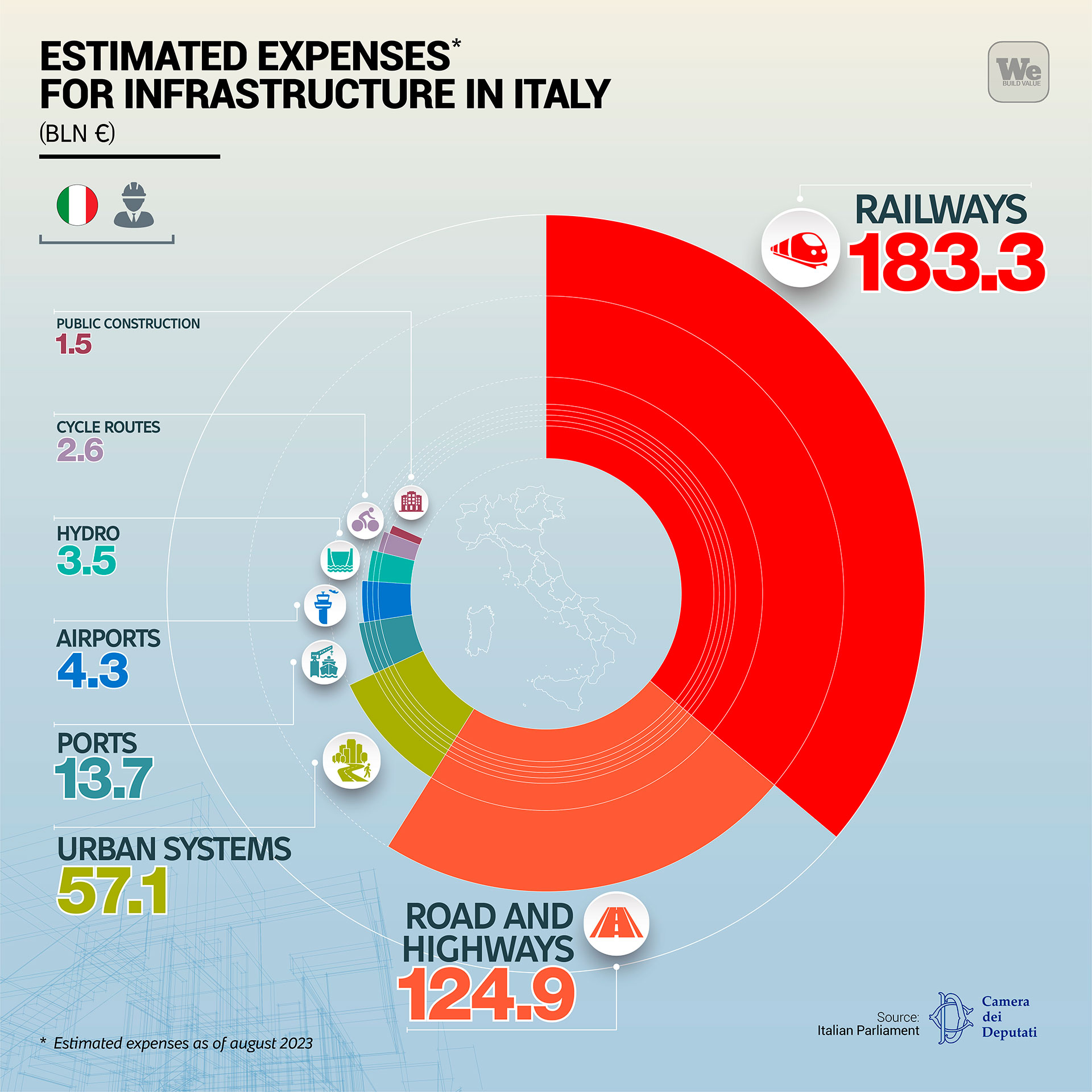Italy is strongly focusing on its infrastructure, planning to spend €447.8 billion, a record figure in the country’s history. This translates into construction sites from North to South, from East to West. The development of high-speed railways, with major routes reaching from Genoa to Milan, Verona to Padua, and eventually to Bari, adds to the improvement of road infrastructure, along with major projects such as the Messina Bridge.
The analytical focus on Italy’s efforts to modernize its infrastructure comes from the Chamber of Deputies, which recently released its annual report on strategic and priority infrastructure, detailing investment and cost data as of December 31, 2023.
Strategic Projects Under Scrutiny
Infrastructure is a priority for Italian development, as outlined by Parliament’s allocation of funds. Of the €447.8 billion earmarked by Italy, 95% (€411.2 billion) falls under the category of strategic and therefore priority infrastructure. Only a small fraction, €36.6 billion, is allocated for non-priority infrastructure. Essentially, almost all planned projects are deemed necessary for the country’s development and will be completed.
Specifically, the majority of costs and projects concern high-speed/high-capacity rail lines, with €111.9 billion of the €183.3 billion expenditure already allocated. Construction of major rail routes is already underway. For instance, Webuild Group has been working for years on the Terzo Valico dei Giovi, connecting Genoa to Milan. Furthermore, construction is ongoing to bring high-speed rail to Bari, to link Padua to Verona, and to significantly improve mobility in Sicily with trains reaching speeds of 200 km/h, connecting Messina, Catania, and Palermo.
Italy is advancing on railway tracks but also doesn’t overlook road development. The planned expenditure for modernizing and constructing roads and highways amounts to €124.9 billion, with €93.3 billion already allocated, while €91.3 billion will be needed for other transport infrastructure, 72% of which is already allocated.
Funding for Infrastructure Development
The PNRR is undoubtedly the primary resource to ensure financial coverage for new projects in Italy. According to the Chamber of Deputies’ report as of August 31 of the previous year, the government had €314.93 billion available for the realization of strategic and priority infrastructure. Of this, €222 billion comes from the National Recovery and Resilience Plan and the Complementary National Plan. Additionally, there are budgetary funds and a small portion from private sources. Overall, this financial provision represents the true engine behind the construction sites open across Italy.
From Sicily to Veneto, from Calabria to Campania, from Puglia to Liguria, projects are underway throughout Italy. Some of these projects enhance and facilitate interregional mobility, while others aim to develop major cities, such as the metropolitan lines being constructed by Webuild in Milan (M4), Naples (Capodichino station), and Rome (line C).
Construction Sites Seeking Workers
Building major projects not only accelerates the country’s modernization process but also creates job opportunities. The Webuild Group, engaged in construction sites throughout Italy, plans to hire 10,000 people by 2026. For this reason, it has launched the Cantiere Lavoro Italia (Italy Worksite) project. This initiative provides training and job placement for young people leaving the school system, unemployed individuals, both skilled and unskilled workers with or without experience, technicians seeking specific training, recent graduates, as well as managers and staff profiles with experience.
According to Webuild’s estimates, 30% of the 10,000 professionals to be hired will come from the Cantiere Lavoro Italia project. This represents an opportunity to revitalize employment in the country, creating jobs and fostering new skills that embody the best of “Made in Italy“.


